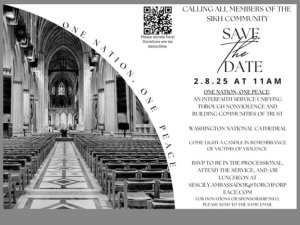|
|
|
Anand - Seeing You within You |
|
Editor’s Note: This series is focused on exploring the core lessons for the soul as embodied in the Anand Sahib, written by the third Sikh Master, Guru Amar Das.
My understanding of what ‘Anand’ means has grown over time and study. The Siri Singh Sahib Bhai Sahib Harbhajan Singh Khalsa Yogi ji gave a great lecture on January 6, 1988, where he described the state and psychology of Anand. This lecture profoundly influenced the way that I approached translating the Anand Sahib. To start, I want to quote a few parts of this lecture, and then summarize a new dimension to the definition of Anand. That will take us out of the emotional realm and into the spiritual realm. “A lot of people think if we do good deeds, we will be in bliss. A lof of people say if we work hard we will be in bliss. A lot of people think that if they do A, B, C and Z they will be in bliss. But it will never work out. “Whenever you create an imbalance in your life, for any reason, there shall be unhappiness. Because without balance, there is no harmony, and without harmony, there is no happiness. It’s a simple law. “Why do we want the Guru? The Guru is a very consolidated, simple wisdom, which keeps our head in balance. That is why when we come to the Gurdwara, we bow to the Guru. We put our head down. We give the Guru that offering. This is one gesture we do so that things may not go to our head in a wrong way. “You don’t have any enemy. Your enemy is your own mind. When your mind controls you, and draws you out of you, and takes you where it wants to take you - you are going to default to dread. “The mind cannot be controlled by you alone. The mind needs meditation. The mind needs positive affirmations. And the Guru’s Word is that positive affirmation. “This is how it works. If the mind cannot see your own soul, and God appears before you, you are useless. Those people who have been told that they’re going to see God and that God will appear to them are totally being misled. God can never appear. It can’t. It has no capacity. God is confined and unconfined. And in confined form - God is you. Within you, your soul is that God. In unconfined form, God is the Ultimate Reality of which your soul is a part. “We do things to please others. What day will come when we will do things to please ourselves? And which self? The passionate self or the compassionate self? A person has to take action to see his or her own soul within his or her own self. That is the purpose of life. And that is Anand. “Nothing will work except your own work. Work to see your own soul. Befriend your own soul. Have Anand with your own soul. You want friendship with the whole world? If your soul is not your friend, what do other friendships mean? Therefore, please understand. Anand is not in too much money. Neither is it in too much power. Neither is it in too much beauty and neither is it in too much destruction. There’s no joy except seeing your own soul within your own self with your inner eye.” Anand describes the experience we have when the relationship between the mind and the soul have come into balance through the word of the Guru. The purpose of life is to see the Divine. But the Divine in its vast totality is too huge for the mind to comprehend. What the mind CAN do is penetrate within and see its own soul. Behold its own Divine Light. When the mind is seeing its True Self, and obeying its True Self, that is the real bliss. Every other bliss - from sex, to food, to drugs, to alcohol, to momentary achievements creates an emotional high that lasts for a while, and eventually fades away. The lasting bliss comes when the mind is trained to relate to its own soul every day, every step of the way. Then whether you are a pauper or a king doesn’t matter. Happiness is guaranteed. However, the mind gets pulled by the environments, and that can create tremendous imbalance in a person’s life. As we go through each Pauree of the Anand Sahib, we will see that Guru Amar Das is talking to the mind, to the body, and to the senses in a very particular way. As we age, new issues come up. New concerns challenge the mind to pull it away from the light of its own soul. So as we grow and mature, we need to continually train our mental faculties to stay anchored to that Light within. This way, our every action embodies the reality of the soul. For this purpose, in the Anand Sahib, I often translate Anand as: “A state of consciousness where every action reflects the reality of the soul.” I think it’s OK to take a lot of English words to express one word of Gurbani. I do not believe that Gurmukhi and English are a one to one language. That everything in Gurmukhi has an exact match in the English language. On the contrary, I believe that Gurbani says things that English has no experience with, and therefore, no words for. The spiritual reality of Anand is one of those terms. With this as a basis of a definition, we can move forward in the weeks ahead to exploring how to cultivate Anand within ourselves as we mature throughout our lives. |
---------------------------------
Related Article:
Anand Sahib: Spiritual Maturity ~ Intro






